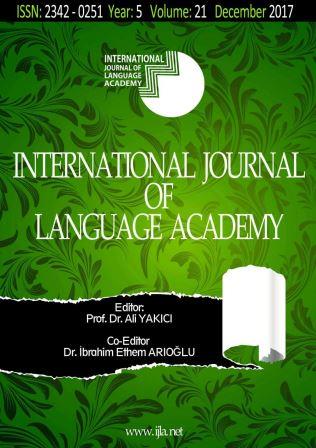Author :
Abstract
İnsancıl psikoloji açısından düşünüldüğünde ‘kendini gerçekleştirme’ terimi çoğunlukla kişiliğe insancıl bir bakış açısı olarak kullanılır. Bireyin psikolosini kavramak ve değerlendirmek için insancıl psikoloji edebiyatta çeşitli karakterlerin analizinde uygulanabilen metodlardan birisidir. Göze çarpan bir psikolog olarak Abraham Maslow bir kimsenin eğitiminde kendini gerçekleştirmeye büyük bir önem verir. O yiyecek, sosyal güvenlik ve kabulü içine alan bir gereksinimler hiyerarşisinden söz eder. Onun için bir kimsenin bireyleşme ve eğitim sürecinde psikolojik bütünlüğünü oluşturmak için her şeye gereksinim duyulur. Maslow, kuramında bireylerin yaşamında kendini gerçekleştirmenin önemini vurgular. O, bu bireylerin sorunları daha kolayca çözebileceğini vurgular. Bu anlamda kendini gerçekleştirenleri son derece yaratıcı ve psikolojik olarak güçlü bireyler olarak tanımlar. Maslow’un piramitinde temel ve daha yüce gereksinimler beş adımlık bir hiyerarşi içinde sunulur. Yiyecek, barınak, güvenlik ve sosyal bağlar temel gereksinimlerken güzellik, iyilik, aşk gibi değerler daha yüce gereksinimler gurubundadır. Maslow için bireyler bu gereksinimlerin eksikliğinde ‘meta-patolojiye’ maruz kalırlar. Bu bağlamda Maslow’un kuramı güdüleyicidir ve hem temel gereksinimler hem de yüce gereksinimler bireylerin davranışlarını harekete geçirirler. Bir kimse eğer önceki basamaklardan tatmin olmuşsa kendini gerçekleştirme aşamasına ulaşabilir. Bu süreç eğer birey önceki aşamalarda başarısızlığa uğramazsa devam edebilir. Bu bağlamda Hanif Kureishi’nin Gabriel’s Gift’i romanın onlu yaşlardaki kahramanı olan Gabriel’in analizinde kendini gerçekleştirmenin izlerini taşır. Gabriel’in babası Rex eski bir rock şarkıcısıdır ve günlük yaşamında tükenmiş bir insandır. Diğer yandan annesi Christine geceleri çalışıp gündüzleri uyur. Saygın bir işi yoktur. Çift olarak iyi bir ilişkiye sahip değillerdir. Rex’in sürekli içkili ve işsiz olması yüzünden sonunda boşanırlar. Rex için yaşamındaki en önemli şey Gabriel’dir. Gabriel de onlu yaşlarda bir çocuk olarak temel ve yüce gereksinimlere sahiptir. Gabriel’in yaşamı, babasının onu çok ünlü bir rock şarkıcısı olan eski arkadaşı Lester Jones ile tanıştırdığında kötüden iyiye doğru değişir. Gabriel, buluşmalarında Lester’a gerçek nesneleri kopya etme konusundaki yeteneğinden söz eder ve onun tarafından övülür. Böylece, aralarındaki diyalog Gabriel’i Maslow’un kendini gerçekleştirme kuramı bağlamında gereksinimler hiyerarşisi içinde kendi başarı yolunu bulması ve aile birlğini tekrar kurması için teşvik eder ve harekete geçirir. Bu bağlamda Gabriel için çok başarılı birisi tarafından harekete geçirilmek üst bir deneyim olarak önemli bir dönüştür ve onu kendini gerçekleştirme yolculuğunda kendini gerçekleştirene dönüştürür. Onun sanatçı yeteneği, inancı ve geleceğe olan ümidi kendisini içinde daha güvenli ve başarılı bulacağı hoş bir geleceğe yöneltir. Bu anlamda Kureishi’nin Gabriel’in sadece ebeveynlerinin karmaşık ilişkisini düzeltmesine değil aynı zamanda da yetenekli bir kişi olarak kendini gerçekleştirmeyi deneyimlemek yoluyla Maslowcu bakış açısından bütün ailenin yaşamını yeniden düzenlemesine izin verdiği söylenilebilir.
Keywords
Abstract
When it is considered in terms of humanistic psychology the term ‘self-actualization’ is mostly used as a humanistic perspective to personality. To grasp and evaluate the psychology of the individual, humanistic psychology is one of the methods that can be practised in the analysis of various characters in literature. As a prominant psychologist Abraham Maslow gives a great importance to self-actualization in one’s education. He deals about a hierachy of needs including the most fundamental ones beginning from food to social security and acceptance. For him, all is needed in order to constitute a psychological unity in one’s individuation and education process. Maslow emphasizes the importance of the self-actualization in the lives of individuals in his theory. He indicates that these individuals are able to solve the complexities more easily. In this sense, he defines self-actualizers to be highly creative and psychologically powerful individuals. In Maslow’s pyramid basic and higher needs are presented in a hierarchy of five steps. Whereas food, shelter, security and social connections are basic needs, such values like beauty, goodness, and love are in the group of higher needs. In the deficiency of these needs, individuals are subject to ‘metapathology’ for Maslow. In this context, Maslow’s theory is motivational, and both basic needs and higher needs motivate the behaviours of individuals. One can reach the step of self actualization if he or she is satisfied with the before steps. This process can go on if the individual doesn’t have a failure in the before steps. In this context, Hanif Kureishi’s novel called Gabriel’s Gift, reflects the traces of self-actualization in the analysis of Gabriel, the teenage hero of the novel. Gabriel’s father, Rex is an old rock musician and an exhausted person in his daily life. On the other hand, his mother, Christine works at nights and sleeps during the day. She doesn’t have a respectful occupation. As a couple they don’t have a good relationship. Because of the fact that Rex is always drunken and unoccupied they divorce at last. For Rex, the most important thing in his life is Gabriel. Gabriel has also basic needs and higher needs as a teeneager. Gabriel’s life changes from bad to good when his father introduces him to his old friend Lester Jones, a very famous rock musician. Gabriel talks to Lester about his talent for copying real objects in their meeting and he is praised by Lester. Thus, the dialoque between them urges and motivates Gabriel to find his way of success and to set up his family’s unity again in a hierarchy of needs in terms of Maslowian theory of self-actualization. In this context, that is the important turn as a peak experience to be motivated by a very successful person for Gabriel and it turnes him to a self- actualizer throught his journey of self-actualization. His artistic ability, belief and hope for future lead him to a favourite future in which he finds himself more confidant and successful. In this sense, it can be said that Kureishi lets Gabriel not only correct his parents’ turbulent relations with each other and also reorganize all the family’s life as a gifted person by experiencing self actualization in Maslowian perspective.





